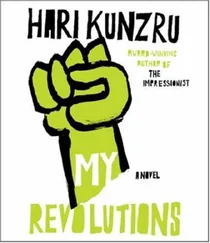She would talk about feeling rootless. She was an only child. As soon as she left home, her parents severed all ties with the Long Island suburb where she’d grown up and moved to Arizona. “So my dad could live on a golf course and my mom could get skin cancer” was how she put it, her voice dripping betrayal. Jaz had never felt anywhere belonged to him enough to feel strongly about losing it. He did his best to sympathize.
They flew to Phoenix for Thanksgiving. Mr. and Mrs. Schwartzman lived in a giant subdivision of identical ranch-style houses. They were kind and curious, asking questions about his family and his “culture,” a word they used as if it denoted something fragile that might break if roughly handled. Her father drove him to the store to pick up wine for lunch, showing off the neighborhood as if it were his personal property. The tennis courts, the swimming pool, the landscaping in front of the clinic, all of it was important to him; in all of it he had a stake. Jaz felt awkward. The things he’d done with this man’s daughter! He felt he wouldn’t be able to look the man in the face unless he said something. Later, Lisa told him it was the phrase “honorable intentions” that made Mr. Schwartzman erupt into laughter.
When Lisa announced that she was moving to New York, he felt like a sinkhole had opened up beneath his feet. By that time he was writing up his thesis and thinking about applying for postdoctoral jobs. He knew their life, commuting between rooms in shared houses in Boston and Providence, wasn’t sustainable “in the long term.” But that was the long term, not the short term, let alone now. He was happy. He didn’t want anything to change.
“Jaz, I’ve been talking about it ever since we met. It’s not like I’m springing it on you.”
“Sure, but I thought — well, I thought we’d at least talk about it.”
“What’s to talk about? You know it’s what I want.”
“But what about us?”
“It’s up to you, Jaz. If you’re serious about me, you’ll think of something.”
“I am serious.”
“I’m not so sure.”
“How can you say that? I love you!”
“I know you think you do.”
“What’s that supposed to mean? You don’t believe I know my own mind?”
“Well, what about your family? It’s hard, I get that. But if you won’t even introduce me to them, what does that say about us? Jaz, deep down I think all you really want is a Punjabi girl. You’ll string me along for a while because it’s comfortable and — oh, I don’t know — because you like the sex, but you’ll never commit. And then you’ll marry someone else, some girl who can make samosas with your mom.”
“Lisa, that’s not true.”
“I think it is.”
“So you’re going to do this? You’re just going to leave?”
“Well, it looks that way, doesn’t it.”
They didn’t speak for several days. He lay curled up on the couch, watching whole seasons of a TV show about an alien invasion. And then she was gone, staying with a friend in Brooklyn while she looked for an apartment. He thought his life was over. A friend had to explain it to him.
“Go get her, Jaz. She’s waiting to see if you’ll come after her.”
It was the best decision of his life. He rented a car and drove to New York, getting horrendously lost somewhere in Queens. At last, late on a Saturday night, he found himself pressing a buzzer on an old industrial building in Williamsburg. There was no reply, and he hung around outside for more than an hour before Lisa turned up, several cocktails into her evening, hanging on to her friend Amy.
“I want to be with you,” he said to Lisa, as Amy hovered indiscreetly close, covering her mouth with her hands and making little cooing noises. “I’ll live anywhere. I’ll introduce you to my family, all the cousins, my aunts and uncles, so many relatives you’ll beg for mercy. Just say you’ll be with me.”
In later years Amy would tell elaborate, highly embellished dinner-party accounts of the scene, “the most romantic thing she’d ever witnessed.” Lisa always blushed and made feeble attempts to stop her, but it was clear she enjoyed the tales. It had been a proposal in all but name, though Jaz saved the real proposal for after he’d fulfilled his promise. As he made arrangements for the trip, he hid how nervous he was, trying not to frighten her with too many instructions about what to wear and how to behave. He knew the meeting would go badly — it was just a question of whether she’d come away too scared to stay with him. As they drove down to Baltimore, he felt like a condemned man on his way to the chair.
His parents had taken the news of Lisa’s existence about as well as could be expected. On the phone, his mother asked her family name, where her parents lived. When he raised the subject of a visit, she responded with a sort of icy neutrality. If God wills it, she said, you will come. His father was warmer. Your family misses you, beta. It’s been too long. Jaz booked a motel room, so the question of sleeping arrangements didn’t arise. Lisa wore a pantsuit and a long-sleeved shirt, despite the humid summer weather. As they passed block after block of boarded-up row houses, she looked uneasy, and was visibly relieved when they pulled up outside his parents’ place, which, though small, was at least not in a neighborhood that looked abandoned.
They ate lunch, which his mom had prepared with help from Seetal and Sukhwindermassi. There was none of the usual bustle, no running around, no jokes or high jinks. For long periods the rattle of the elderly air conditioner was the loudest noise in the room. His dad offered Lisa a whiskey and was displeased to see she accepted. As she sat and sipped her drink, Jaz shuffled his feet and tried to keep the conversation from petering out. In vain he translated some of Lisa’s approaches to his mother, questions about her house, compliments on the food. She wouldn’t respond, just scurried back into the kitchen and pretended to busy herself with pots and pans. Bravely Lisa persevered through the meal, trying fruitlessly to make a connection, helping Seetal and Uma carry dirty plates, even attempting to take charge of doing the dishes; Uma led her politely back into the living room, where Jaz was chatting with his uncles about real estate. She looked thoroughly dejected. Discreetly he squeezed her hand, earning an extra look of disapproval from his father.
Later they sat in the car outside the house. Lisa fumbled angrily in her purse for tissues.
“It’s not you,” he told her. “You understand that, don’t you? They’d be like that with anyone.”
“Anyone white.”
“It’d be the same with a lot of Indians.”
She smiled wanly, dabbing at her eyes. “It wasn’t so bad.”
“Yes, it was.”
“You’re right. It was awful.”
She saw the look on his face and reached out to squeeze his hand. “Don’t worry, Jaz. I won’t run away.”
A few weeks later he took her to an expensive French restaurant in the West Village and asked her to marry him. He was still half expecting her to say no, but she looked at the ring and grinned and kissed him and a waiter materialized with champagne and the other patrons clapped politely, inaugurating what he now remembered as the best year of his life. They moved into a tiny walk-up in Cobble Hill. He commuted back to Cambridge to see his adviser and she started reading manuscripts for a small publisher. They bought flea-market furniture and went on long walks and made love so frequently and loudly that the crazy French woman downstairs began phoning the super. They cooked pasta and risotto for other young couples, drinking red wine out of ill-matched glasses and arguing about books and films. Once they roasted a chicken for Lisa’s parents, the four of them squeezed around the little kitchen table, clamping their elbows to their sides as they cut up their food. His own parents never saw that apartment. They were too busy, they said, to come to New York. “With what?” he asked. “So many things,” said his father, his voice trailing away.
Читать дальше












